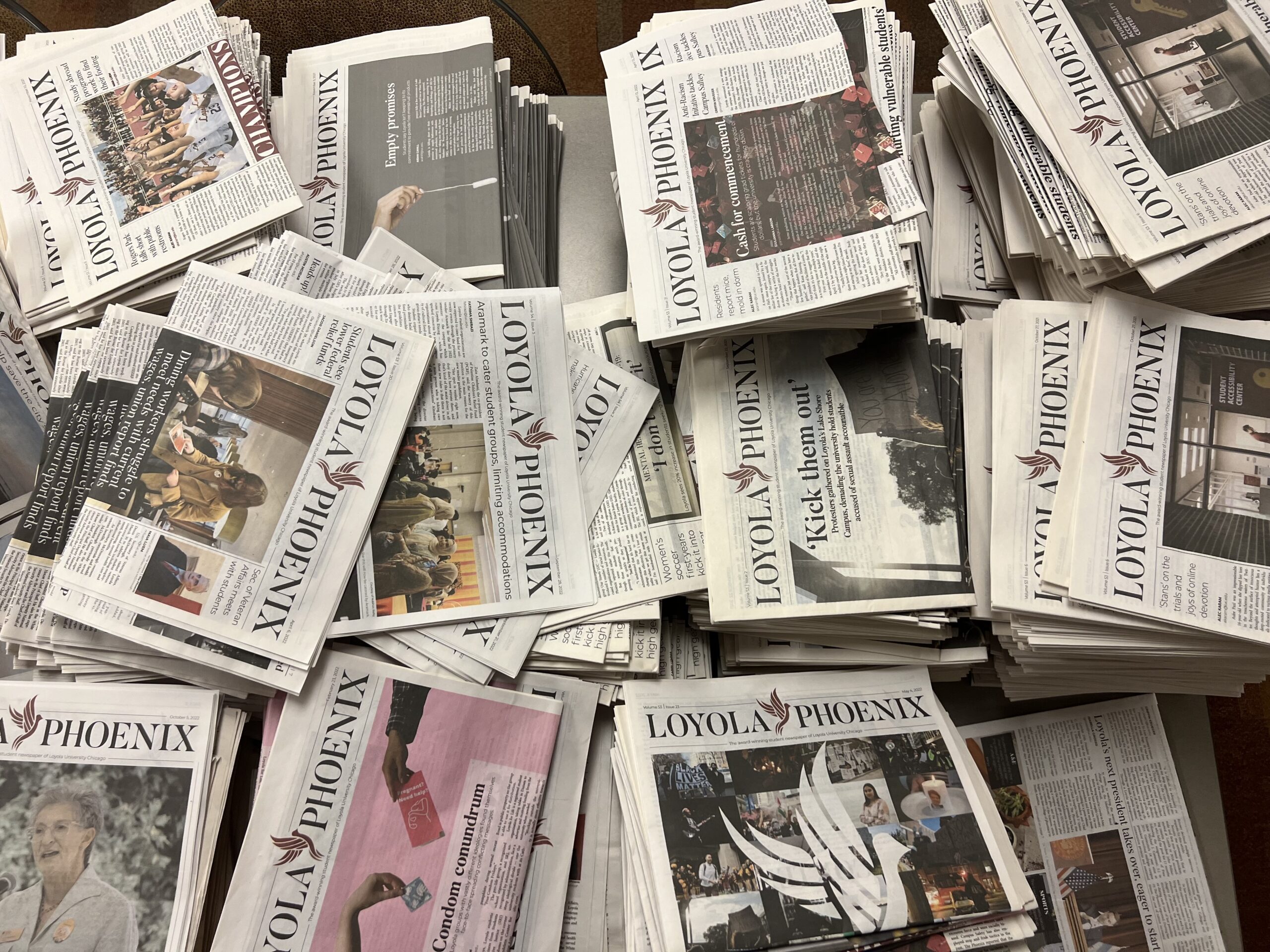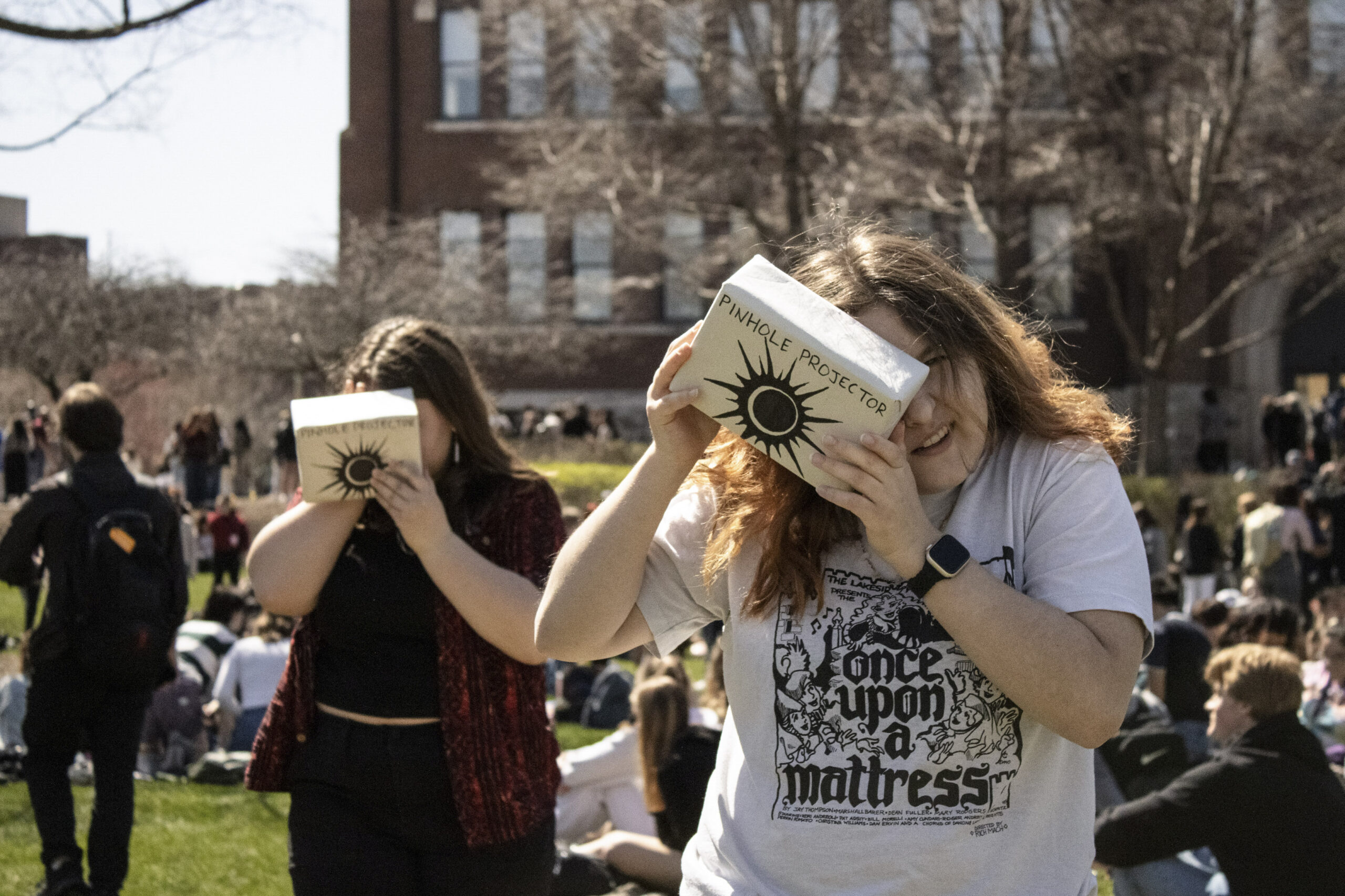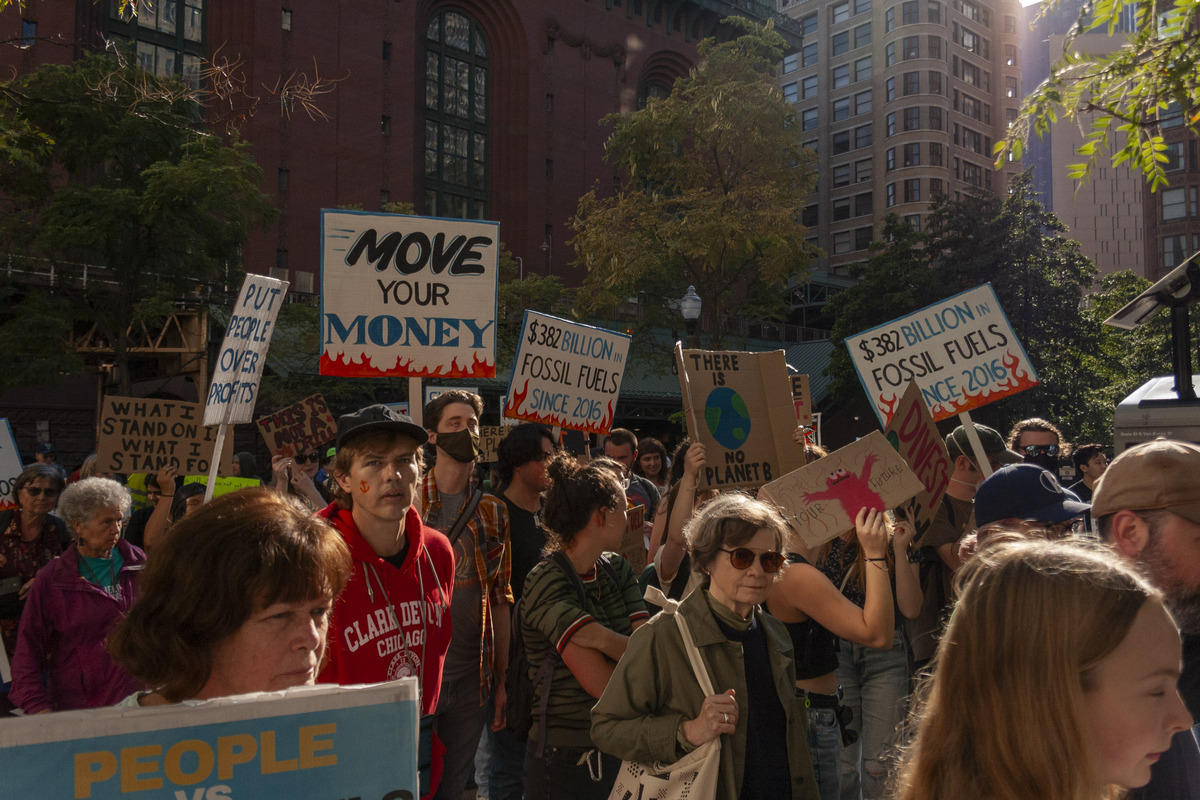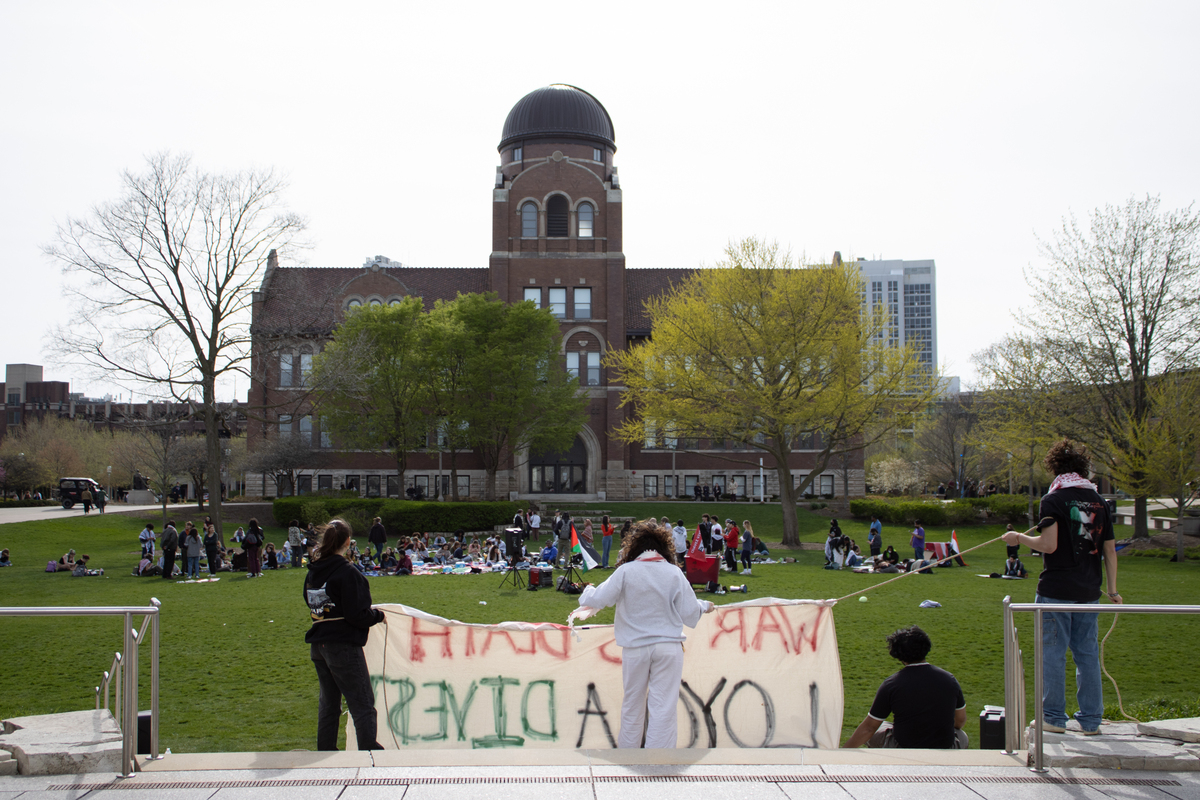School of Environmental sustainability hosts climate conference
Loyola’s Annual Climate Change Conference Hosts Bloomberg Journalist, Author

The School of Environmental Sustainability hosted its annual Climate Change Conference March 14-15 with an overarching theme of attaining stable food security.
Titled “Feeding a Changing World: Climate Change and Global Food Systems,” the conference highlighted expert voices from various intersecting disciplines on the impact of climate change towards global food security.
A keynote presentation kicked-off the two-day conference on Thursday. Exhibits, panel discussions and student poster sessions were held the second day, according to the SES website.
The two-hour keynote event and Q&A session was held in the Sister Jean Dolores Schmidt, BVM Multi-Purpose Room located on the second floor of the Damen Student Center. The keynote speaker, Amanda Little, is an opinion columnist for Bloomberg and a journalism professor at Vanderbilt University.
Little is also the author of “The Fate of Food: What We’ll Eat in a Bigger, Hotter, Smarter World,” which tackles the future of food sustainability.
The attendance for the conference was the largest in the event’s nine-year history — 1,700 total people registered, both in-person and online, according to Nancy Tuchman, the founding dean for the SES.
Shortly after Brandon Folson, a pre-law student, recited Loyola’s Land Acknowledgement Statement, Tuchman shared some of the achievements made by SES within recent years, citing program achievements and goals for the future.
“To date, Loyola has accomplished a 70% reduction in our carbon emissions, and we are on track to be carbon neutral by January of 2025,” Tuchman said, addressing the Climate Action plan published by the SES.
Tuchman introduced students from Ignatian Voices, the percussion ensemble and the dance program for a singing and accompanied choreographed performance of “Apple Tree” by AURORA, a song discussing hope in securing a stable future.
After the performance, Tuchman returned to the podium to introduce the keynote speaker, adding that Little’s work offered unique solutions for environmental problems in engrossing manners.
Before starting her 45-minute presentation, Little asked for an update on the concurring quarterfinal matchup at the Atlantic 10 Men’s Basketball Championship between Loyola and St. Bonaventure — occasional shouting could be heard from students and faculty watching the game live on a projector downstairs in the atrium.
“Feel free to shout it out when we know what has happened,” Little said of the double overtime game. “You all are heroic for being here and resisting the pull of this white-knuckled ending to the game.”
Little explored the most “urgent” problems in global food production alongside its relevance, its reasoning for being an “economic and moral imperative” and how sustainable foods are redefined on a large scale.
Little began by diving into her multi-year experiences with investigating these questions, explaining her research is centered on the future of food cultivation.
Citing a prediction from the International Panel on Climate Change, Little said arable land — or earth well-suited for crop cultivation — will decline 2-6% every decade moving forward due to stresses from the climate. She showed a map of the Earth’s arable land alongside her presentation to help attendees see the predicted shrinkage of farmable land by 2050.
“It’s critical to note that, overwhelmingly, the climate stressors of heat and drought in particular will fall hardest on smallholder farmers,” Little said of small-scale agriculturalists who depend on their own labor rather than larger-scale production.
After playing a 50-second montage of recent news coverage about the depletion of global food supplies and its effect on society, Little referenced a 2023 study from the American Farm Bureau Federation that said U.S. farmers lost nearly 20 billion dollars in crops within the past year from severe weather, but the focus has to shift onto the cultivators themselves.
“I want to stress that the most concerning impacts are not on the crops themselves, but on the people who tend to them,” Little said. “It’s an accepted reality that the business of food in the United States is sustained by the toil and grit of mostly undocumented immigrants.”
Little said in researching content for her book, 75% of the growers and labor contractors she has interviewed fall into this category. Additionally, she said 40-50 heat stress-related deaths are recorded in a year among workers who have little-to-no healthcare support.
These workers are also “uniquely vulnerable” to other climate-induced events such as excessive heat, drought, wildfire pollution and excessive rainfall, according to Little.
Shifting focus to solutions for the impending worldly issues, Little spoke to her experience in researching resilient food systems such as vertical farming and indoor cropping.
“Given the 24-hour cycle, more food can be grown inside the space of a soccer goal than can be grown in the space of a soccer field outdoors,” Little said. “When located in your cities, these vertical and indoor cropping facilities can eliminate huge amounts of trucking and freeways, of course, slash the use of chemicals.”
Comparatively, Little said plant-based and alternative meat production and its little bacterial contamination, alongside its ability to lower carbon dioxide emissions by 85%, is promising. With the liberation of land set aside for cattle grazing, a shift towards alternative meat production could prove to be cost-effective and radically efficient, according to Little.
Little concluded her presentation by addressing the recently-published 2022 Census of Agriculture, acknowledging that the average American farmer is 58.1 years old — an increase by about half a year compared to the last census in 2017.
She spoke of the importance of the rising generation of farmers and how the occupation will shift in the coming decades due to technological advances in the agricultural industry.
“The definition of ‘farmer’ is changing,” Little said. “The field might look like the laboratories and facilities you’ve been developing here on campus. And I think Gen Z has great promise to bring us into a new era in which human innovation that marries new and old approaches to food production can — and I think you have good reason to believe, will — redefine sustainable food on a grand scale.”
Following Little’s keynote presentation, the remaining hour left was a designated Q&A session for in-person attendees and online viewers.
Megan Barnhart, president of the Student Environmental Alliance, said members of the club were told to attend the conference in place of their general meeting in order to encourage members to get involved with sustainability.
“I learned so much about sustainable agriculture and how broad it is and how many different perspectives are needed to solve it,” said Barnhart, an environmental economics and sustainability major. “I never really realized how exciting the future could be about it, so now I’m genuinely interested to look into it.”
Karen Crawford, an attorney based in Chicago, said she was attracted to the conference for her general interest in environmental sustainability. After researching the topic to learn more about the issues, Crawford learned about the conference and said it was the “perfect opportunity.”
“It’s exciting to learn about the things being done in technology to improve farming to make it more sustainable,” Crawford said.
Robert Kennedy, an international affairs graduate student, said he brought attention to the keynote presentation in class — prompting his professor to allow him and his classmates to leave early.
Citing the SES building as the reason he came to Loyola, Kennedy said he was “blown away” by the university’s commitment to sustainability, referencing Little’s appreciation for campus efforts.
“I think that it is important for every single department at Loyola and elsewhere to consider climate change as a part of what they should be teaching,” Kennedy said. “Climate change is going to be affecting every single aspect of our lives.”
A full recording of the presentation can be found on the SES YouTube channel.
Featured Image by Xavier Barrios / The Phoenix










